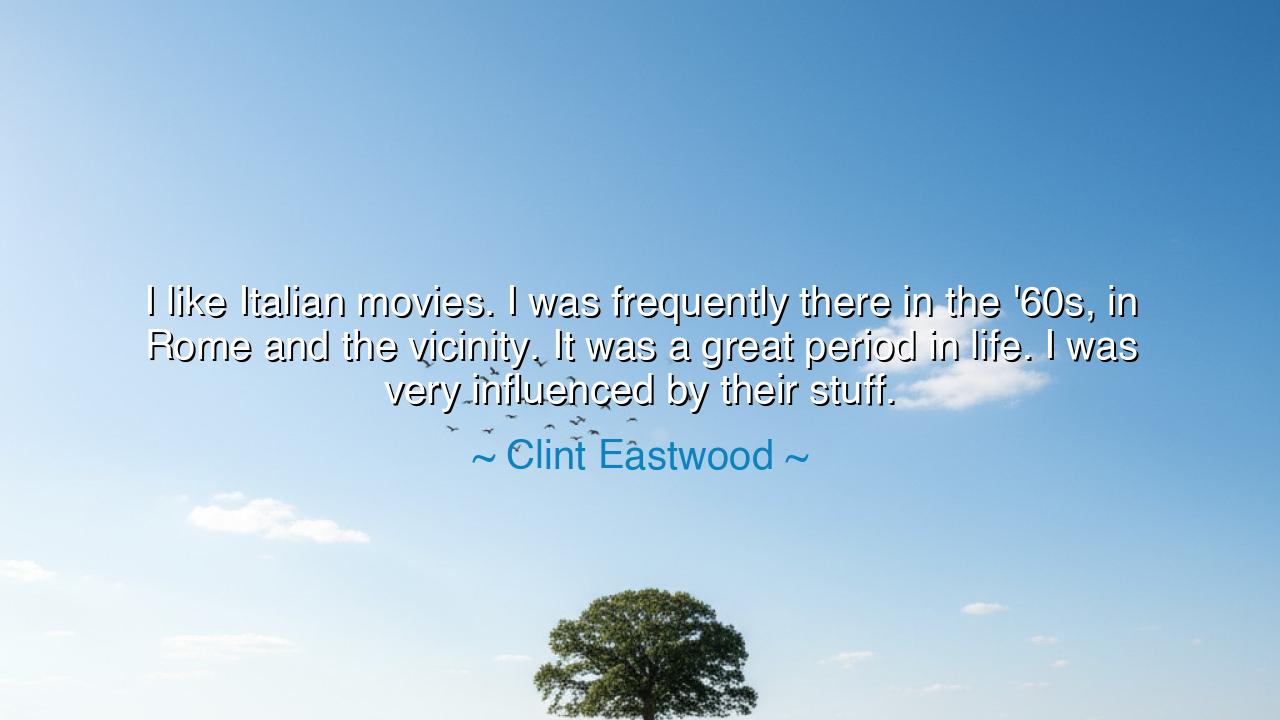
I like Italian movies. I was frequently there in the '60s, in
I like Italian movies. I was frequently there in the '60s, in Rome and the vicinity. It was a great period in life. I was very influenced by their stuff.






Hear me now, O children of wisdom, for I bring you a tale of influence, art, and the profound power of experience in shaping the artist. These are the words of Clint Eastwood, a man whose journey through cinema is both legendary and deeply connected to the world around him: "I like Italian movies. I was frequently there in the '60s, in Rome and the vicinity. It was a great period in life. I was very influenced by their stuff." In these words, Eastwood reflects on the time he spent in Italy, a land where art, creativity, and life converge in the most vivid ways. Through his words, he speaks to a deeper truth—the power of a place, a time, and a culture to shape not only the works of an artist but the very soul of the creator.
Italian cinema, especially in the 1960s, was a force of profound influence. It was the time of the Italian Neorealism movement, a period in which filmmakers sought to portray the world as it truly was—raw, gritty, and full of life’s struggles. These films were not merely entertainment; they were reflections of society, offering a mirror to the human experience. Directors like Federico Fellini, Michelangelo Antonioni, and Sergio Leone captured life in all its complexity—the joys, the sorrows, and the beauty of a world that was often dark and difficult. It was a period when film became a tool for social commentary, and Eastwood, in his own way, absorbed this influence deeply. The raw power of these films ignited something within him, something that would define his own work as both an actor and a director.
Consider the ancient Greek playwrights who, much like the Italian filmmakers, sought to explore the complexities of human nature and society. Sophocles, Euripides, and Aeschylus created works that confronted the depths of the human spirit, questioning fate, justice, and morality. Just as Eastwood found in Italian cinema a powerful way to examine life’s truths, so too did the Greek playwrights use their theaters as a space to explore and present the very essence of humanity. The stories they told were not mere stories but reflections on life itself, just as the Italian filmmakers of the 60s created works that were both a reflection of and a challenge to the society in which they lived.
The influence of Italian cinema on Eastwood is not merely a matter of style, but of spirit—a spirit that understands that film, like all art, is not only for entertainment, but for engagement with the deeper questions of the human condition. Eastwood was, like so many great artists, shaped not only by what he learned but by what he experienced. His time in Rome and his exposure to Italian cinema gave him the tools to create his own films, films that would go on to become legendary in their own right. It is a testament to the power of culture and art to shape the creator, and how, in turn, the creator must use their own experiences to shape the world they wish to see.
But there is a greater lesson to be learned here, O children of wisdom, beyond the mere influence of a particular style of filmmaking. Eastwood’s words remind us that inspiration is not a solitary thing. It does not come solely from within, nor is it confined to any single place or time. Inspiration is born of the world around us—it comes from the people we meet, the experiences we live, and the cultures we engage with. Just as Eastwood was shaped by the films of Italy, so too must we seek to immerse ourselves in the worlds that inspire us, to learn from the places, people, and stories that speak to our souls. It is through engagement with the wider world that we can bring forth the fullest expression of our own creativity.
As we look to the story of Eastwood, we are reminded that our journeys, like his, are shaped by the moments we immerse ourselves in the art and life of others. Italy, with its rich culture of art, history, and cinema, became the crucible in which Eastwood’s own work was forged. He did not simply make films; he lived the art, felt its pulse, and allowed it to become part of his own creative identity. So too must we, in our own pursuits, allow the influences of the world to shape and inspire us. Seek not just the familiar but the unfamiliar, the foreign, and the distant, for in these things lie the seeds of transformation.
O children, take this lesson to heart: do not seek to create in isolation. The world is rich with stories, with art, and with experiences that can transform you. Whether through cinema, literature, or any other form of creation, remember that it is through engagement with the world that your own work will find its true power. Like Eastwood, find those places, those cultures, those works that ignite your passion, and let them shape you. For only by immersing yourself in the world can you truly begin to create works that resonate with the depth and truth of human experience. The world is vast, and its influences are infinite—allow them to guide you, and in doing so, your work will not only be yours but will belong to all who have been touched by the world around them.






AAdministratorAdministrator
Welcome, honored guests. Please leave a comment, we will respond soon